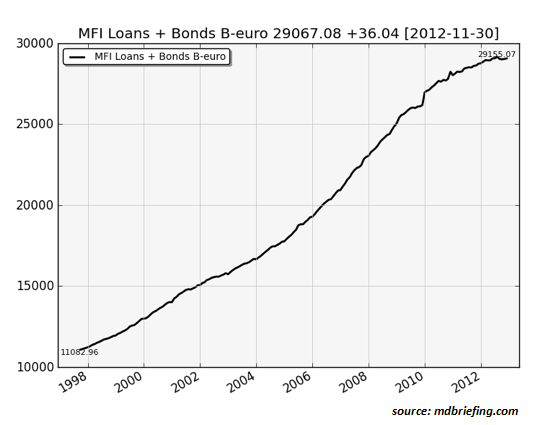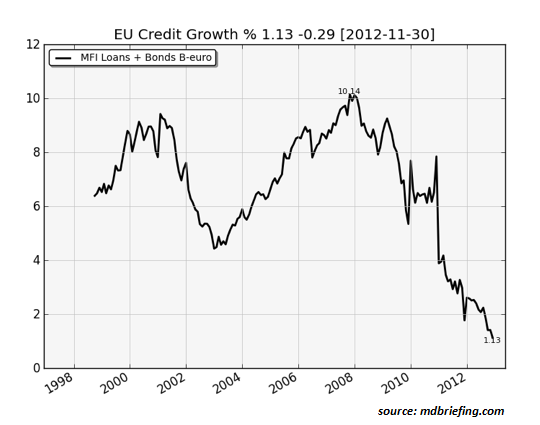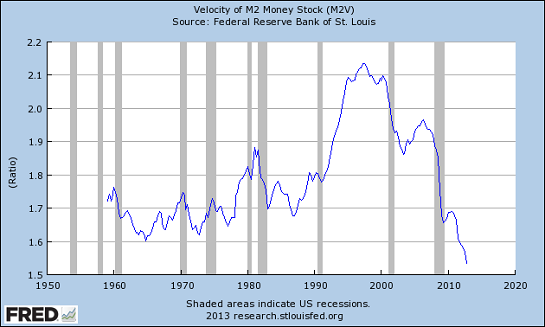“Follow the munKNEE” via Facebook or Register to receive articles via our Intelligence Report newsletter (Recipients restricted to only 1,000 active subscribers)
For those who haven’t yet grasped the uselessness of government policy, please read Charles Hugh Smith’s simple fourteen point explanation below. It details: 
- the steps government has taken,
- why they are failing,
- why the middle and poorer classes must get poorer and
- suggests that we are close to the end of the Ponzi scheme that has provided the myth that our economy has been strong for the last couple of decades.
So writes “Monty Pelerin” (www.economicnoise.com) in a recent post* entitled For Simple Minded Keynesians in which he includes the following excerpts from Smith’s (www.oftwominds.com) article** entitled The Global Endgame in Fourteen Points:
This article is presented compliments of www.FinancialArticleSummariesToday.com (A site for sore eyes and inquisitive minds) and www.munKNEE.com (Your Key to Making Money!) and may have been edited ([ ]), abridged (…) and/or reformatted (some sub-titles and bold/italics emphases) for the sake of clarity and brevity to ensure a fast and easy read. Please note that this paragraph must be included in any article re-posting to avoid copyright infringement.
“An over-indebted, overcapacity economy cannot generate real expansion. It can only generate speculative asset bubbles that will implode, destroying the latest round of phantom collateral. Below I outline the global endgame in fourteen points:
1. In the initial “boost phase” of credit expansion, credit-based capital ( i.e. debt-money) pours into expanding production and increasing productivity: new production facilities are built, new machine and software tools are purchased, etc. These investments greatly boost production of goods and services and are thus initially highly profitable.
2. As credit continues to expand, competitors can easily borrow the capital needed to push into every profitable sector. Expanding production leads to overcapacity, falling profit margins and stagnant wages across the entire economy.
Resources (oil, copper, etc.) may command higher prices, raising the input costs of production and the price the consumer pays. These higher prices are negative in that they reduce disposable income while creating no added value.
3. As investing in material production yields diminishing returns, capital flows into financial speculation, i.e. financialization, which generates profits from rapidly expanding credit and leverage that is backed by either phantom collateral or claims against risky counterparties or future productivity.
In other words, financialization is untethered from the real economy of producing goods and services.
Who in the world is currently reading this article along with you? Click here
4. Initially, financialization generates enormous profits as credit and leverage are extended first to the creditworthy borrowers and then to marginal borrowers.
5. The rapid expansion of credit and leverage far outpace the expansion of productive assets. Fast-expanding debt-money (i.e. borrowed money) must chase a limited pool of productive assets/income streams, inflating asset bubbles.
6. These asset bubbles create phantom collateral which is then leveraged into even greater credit expansion. The housing bubble and home-equity extraction are prime examples of theis dynamic.
7. The speculative credit-based bubble implodes, revealing the collateral as phantom and removing the foundation of future borrowing. Borrowers’ assets vanish but their debt remains to be paid.
8. Since financialization extended credit to marginal borrowers (households, enterprises, governments), much of the outstanding debt is impaired: it cannot and will not be paid back. That leaves the lenders and their enabling Central Banks/States three choices:
- a) The debt must be paid with vastly depreciated currency to preserve the appearance that it has been paid back.
- b) The debt must be refinanced to preserve the illusion that it can and will be paid back at some later date.
- c) The debt must be renounced, written down or written off and any remaining collateral liquidated.
9. Since wages have long been stagnant and the bubble-era debt must still be serviced, there is little non-speculative surplus income to drive more consumption.
10. In a desperate attempt to rekindle another cycle of credit/collateral expansion, Central Banks lower the yield on cash capital (savings) to near-zero and unleash wave after wave of essentially “free money” credit into the banking sector.
Enjoying this article?
Then stop surfing the net looking for more informative articles.
The best of the best are posted on munKNEE.com!
Sign up here to receive them all via our Intelligence Report newsletter.
The mailing is free and restricted to only 1,000 active subscribers.
Act now!
11. Since wages remain stagnant and creditworthy borrowers are scarce, banks have few places to make safe loans. The lower-risk strategy is to use the central bank funds to speculate in “risk-on” assets such as stocks, corporate bonds and real estate.
12. In a low-growth economy burdened with overcapacity in virtually every sector, all this debt-money is once again chasing a limited pool of productive assets/income streams.
13. This drives returns to near-zero while at the same time increasing the risk that the resulting asset bubbles will once again implode.
14. As a result, total credit owed remain high even as wages remain stagnant, along with the rest of the real economy. Credit growth falls, along with the velocity of money, as the central bank-issued credit (and the gains from the latest central-bank inflated asset bubbles) pools up in investment banks, hedge funds and corporations.
The net result: an over-indebted, overcapacity economy cannot generate real expansion. It can only generate speculative asset bubbles that will implode, destroying the latest round of phantom collateral.
Here are three charts that illustrate #14:
Eurozone credit since the inception of the euro. This is roughly equivalent to TCMDO (Total Credit Market Debt Owed) in the U.S.

Eurozone credit growth:

Money velocity in the U.S.:

That is the endgame in three charts. Checkmate, game over.”
Editor’s Note: The author’s views and conclusions are unaltered and no personal comments have been included to maintain the integrity of the original article. Furthermore, the views, conclusions and any recommendations offered in this article are not to be construed as an endorsement of such by the editor.
*http://www.economicnoise.com/2013/03/10/for-simple-minded-keynesians/ (© 2013 Monty Pelerin’s World) **http://www.oftwominds.com/blogfeb13/global-game2-13.html (All content, HTML coding, format design, design elements and images copyright © 2013 Charles Hugh Smith, All rights reserved in all media, unless otherwise credited or noted; I am honored if you link to this essay, or print a copy for your own use.)
Advertisement
China Calling!
We can establish your products there – we’ve already done it for others
Chinese market is 4x bigger than those of the U.S. and Canada combined
MAJOR need for:
– pollution treatment/prevention equipment (water & air),
– disease detection/treatments (diabetes & cancers),
– green energy products (heating & power).
Visit Global Linkages and then contact us to discuss opportunities
We’re off to Beijing & Shanghai again this month
Contact us today
Related Articles:
1. 50 Reasons to Seriously Consider Becoming a Prepper – Financially or Otherwise
[While] I am not a prepper in the traditional sense of stockpiling food, guns and the like, I have always considered myself a financial prepper…For anyone not familiar with how dicey matters are becoming, [however,] I suggest they read the 50 questions below. Words: 1323I keep wondering to myself, do our money-printing central banks and their cheerleaders understand the full consequences of the monetary debasement they continue to engineer? [Below is what I think awaits us.] Words: 1013
3. If You Are Not Preparing For a US Debt Collapse, NOW Is the Time to Do So! Here’s Why
Timing the U.S. debt implosion in advance is virtually impossible. Thus far, we’ve managed to [avoid such an event], however, this will not always be the case. If the U.S. does not deal with its debt problems now, we’re guaranteed to go the way of the PIIGS, along with an episode of hyperinflation. That is THE issue for the U.S., as this situation would affect every man woman and child living in this country. [Let me explain further.] Words: 495
4. The “Great Crisis” Is Well On Its Way and Will Make 2008 Look Like a Joke!
For over two years now, I’ve been warning that the 2008 Crash was just a warm up and that the REAL Crisis would occur when the stock market realized that the Central Banks, lead by the US Federal Reserve could NOT actually hold the financial system together. Well, the Crisis I’ve been warning about is here. [Let me explain.] Words: 306
“World Debt 101″ examines some of the world’s largest economies and illustrates just how much they have borrowed and what measures many of their governments are now taking to curb spending and narrow those deficits.
Those dependent on the welfare state are unaware that their benefits are not sustainable. Most believe tomorrow will be like today and the checks will keep coming from Mother Government. Political power was gained based on promising these benefits. No politician will risk his position by trying to reduce them. No democratic society has ever rolled them back via peaceful political means. [At worst,] the economy and society could end up in ashes [and, at best,] the world is in for a long period of stagnation, retrogression and conflict. [Let me explain more fully.] Words: 1115
7. Is TEOTWAWKI Imminent – Or Will It Be Deferred?
For those who didn’t get the memo, TEOTWAWKI stands for “the end of the world as we know it” and that is what David Korowicz predicts – a disaster of unprecedented proportions sometime this decade – an “ultimate” crash that will be irreversible – that will be TEOTWAWKI! Words: 1395
8. Are Preparations Being Made For Worldwide Financial Collapse?
Something really strange appears to be happening. All over the globe, governments and big banks are acting as if they are anticipating an imminent financial collapse. Here’s some of what is being said and is apparently happening. Words: 1200
9. Don’t Ignore the Coming Financial Storm – It IS Coming and Here’s How to Get Prepared
Many people refer to me as a “doom and gloomer” because I run a website called “The Economic Collapse”. [Just because] I am constantly pointing out that the entire world is heading for a complete and total financial nightmare, [however,] I don’t think that it does any good to stick your head in the sand. I believe that there is hope in understanding what is happening and I believe that there is hope in getting prepared. [This article does just that.] Words: 2432
10. Nothing Can Be Done to Avoid Coming World-wide Depression! Here’s Why
Governments everywhere are becoming more distressed and desperate as economic realities dominate the political doublespeak. The world is at a dangerous point. Much of what we thought we knew and assumed regarding governmental behavior and economics is beginning to be reassessed. Governments of the world are out of money and out of ideas. The ponzi scam that has been perpetrated for over fifty years is collapsing under its own weight. There are not enough suckers and capital left to sustain the fraud. [Let me explain further.] Words: 999
11. Government Can’t Prevent the Next Financial Diaster – Here’s Why
12. Martin Weiss: You Are Being Forewarned – Again – About an Imminent Financial Megashock!


 munKNEE.com Your Key to Making Money
munKNEE.com Your Key to Making Money









